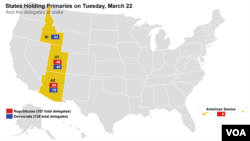Businessman Donald Trump and Texas Senator Ted Cruz split two U.S. Republican presidential nominating contests Tuesday, while on the Democratic side, Vermont Senator Bernie Sanders won two of three state races against former Secretary of State Hillary Clinton.
In Arizona, a state along the U.S.-Mexican border, Trump routed Cruz, winning all 58 of the state's delegates to the Republican national nominating convention in July. Cruz easily defeated Trump in heavily Mormon Utah and will get all 40 of the state's convention delegates. The third contender in the race, Ohio Governor John Kasich, was not a factor in either Arizona or Utah.
In the Democratic contest, Clinton easily outdistanced Sanders in Arizona in a party primary election, while he handily won party caucuses in Utah and a third western state, Idaho. For the day, Sanders picked up 57 convention delegates to 51 for Clinton, but still trails far behind the former top U.S. diplomat.
In the Republican contest, a total of 1,237 convention delegates is needed win the nomination. Trump has about 60 percent of that figure, amassing 739 delegates, followed by Cruz with 465, Florida Senator Marco Rubio, who has dropped out of the race, with 166, and Kasich, with 143.
There are more than 20 Republican state-by-state contests yet to be decided, with another 935 delegates at stake. Trump would have to win about 53 percent of the remaining delegates to claim the nomination ahead of the national nominating convention.
In the Democratic race, the winning nominee needs 2,383 convention delegates. Currently, Clinton has about 70 percent of that total, with 1,681, to 937 for Sanders. In the upcoming contests, another 1,993 Democratic convention delegates at stake, and Clinton would win the nomination by getting about 35 percent of these delegates.
Tuesday's contests:
Arizona
Democrat: Hillary Clinton
Republican: Donald Trump
Idaho (Democratic caucus only)
Bernie Sanders
Utah
Democrat: Bernie Sanders
Republican: Ted Cruz





